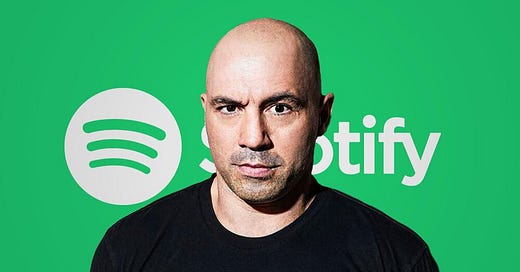Joe Rogan's deal with Spotify and Law Firms
Joe Rogan recently made a deal with Spotify to move his podcast exclusively on their platform. The deal is purportedly worth upwards of USD 100 million and has made waves in popular culture. It is part of Spotify’s game plan to dominate the podcasting space and provide competition to the YouTube monopoly.
Personally I’m a fan of the podcast. Joe’s long-form and free-flowing conversational podcast style allows his guests to be observed and understood by the audience in a non-contrived way.
Why make the move now? Well, I believe it comes down to policies that restrict the freedom of consumers and creators on YouTube. Spotify seeing that, nabs Joe to launch their video platform alternative under the “Podcasting” umbrella, bringing his 8 million subscribers and more occasional audiences. This is clearly a deal that Spotify won’t make a profit on in the short-term, but a long play to disrupt the video content giant, bringing an alternative to the consumers.
So, what does this have to do with law firms? 🤔
Law firms have recently been rudely awakened to their value proposition being cut in half. A traditional law firm’s particular value proposition and brand is built around two fundamental things:
The office and tools,
Existing clientele (the work).
With the inability to flash that fancy office, let alone struggling to get with the times and build their operations on sustainable tools and instead continue trying to implement outdated policies meant for a traditional physical environment, the traditional law firm doesn’t have much to show by way of a unique and attractive value to their workforce.
This paves the way for newer business models, platforms and policies that are both responsive to the times and demonstrate enough agility to deal with whatever comes next. There’s an openness required - and that’s precisely the opposite of what YouTube is showing through their policy implementations, and I believe Spotify is capitalizing on this through their deal. It must be said, the same issues will be found with Spotify eventually as it is the complexity of scale that bring policy problems to the fore.
Essentially it’s harder and takes longer to turn a big ship, though not less impactful if you pull it off! (talk to me if you’re dealing with the how).
The obvious counter argument to what I’m explaining is that the traditional law firm - that job - provides security.
Lawyers working in firms, it might be timely to look at what “job security” means to you and what it means in your workplace. 🔬
Beyond the month to month pay check, have a look. Is the ship your sailing on slowly (or quickly) sinking? Are you being oblivious to the water entering the hull?
If you truly want a good deal (and job security), then you would truly want to know your blood, sweat and tears is not spent on trying to bucket the water back out into the ocean. Because right now, there is an ever-growing contingent of lawyers who are trying to build better ships.
You might feel gloat’y and safe about being on a big ship right now...we all know what happened to the Titanic.
As always, the future of law is in our hands🔥
Q.
Ps. I’m an empathetic iceberg that talks, reach out 😉



